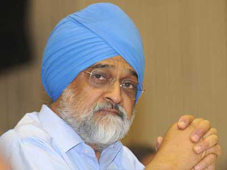NEW DELHI, May 30: Enthused by encouraging findings of a UNICEF-SEWA joint study on direct cash transfer, Plan panel Deputy Chairman Montek Singh Ahluwalia today said its implementation in large scale will not lead to any misuse of money.
“They prove two things. First of all, cash transfers can be organised. Secondly when you give (transfer) the money (into beneficiaries account), it is simply not wasted or used for the wrong things,” he told reporters here at Conference on Unconditional Cash Transfers organised by UNICEF.
Asked about the study highlighting problems faced by beneficiaries in opening bank accounts, he replied, “RBI has issued guideline that the banks will open no frills account.. …Opening a bank account and transacting in a bank will not be a problem (in coming days).”
According to Ahluwalia, direct benefit transfer scheme of government will be a game changer and a very important instrument for the financial inclusion of people of the country.
Government had started the ambitious direct benefit transfer (DBT) scheme on January 1, 2013.
Self Employed Women Association (SEWA) having membership of around 17 lakh entered into a partnership with UNICEF to pilot an unconditional cash transfer (UCT), or basic income grant experiment in rural areas of Madhya Pradesh.
The study done in these rural areas covering 20 villages revealed that recipients of UCT were significantly more likely to contribute to their dwellings.
Besides the beneficiaries’ food basket expanded with expenditure on meat, fish, eggs, vegetables and fruits and these families’ reported low incidence of common illness.
The UCT entirely funded by the UNICEF also led to financial inclusion. The beneficiaries also began using their accounts for saving, rather than keeping money at home.
The UCT also helped improving enrolment of students and attendance in the schools.
The study also inferred that women in these beneficiaries’ families found it easier to access and operate SEWA co-operative accounts than the nationalised bank accounts. (PTI)
Trending Now
E-Paper


